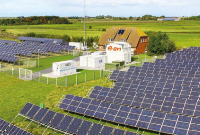Industrial Ecology
| Beschreibung | The globalization of the economy leads to increasing consumption of non-renewable and renewable resources as well as growing emissions. This implies a change of the natural as well as the business environment. Industrial Ecology acknowledges the embeddedness of firms in the natural environment. It is the study of material and energy flows in industrial and consumer activities and of the effects of these flows on the environment. The main characteristics of Industrial Ecology include: a system view of the interactions between industrial and ecological systems, harmoniously integrating industrial activity into ecological systems, and a change from linear (open) processes to cyclical (closed) processes. The lecture provides an overview of the theoretical background of Industrial Ecology and outlines how ecological sustainability can be implemented in everyday business activities. Hereby, various practical examples are incorporated and critically evaluated in classroom discussions. The lecture starts with a discussion of the necessity for a life-cycle approach when pursuing ecological analyses and evaluations. Thereafter, important theoretical fundamentals of Industrial Ecology are reviewed in detail (Macro-, meso-, micro-level). Different pathways on how businesses can implement ecological innovations and improvements are illustrated and discussed. In this context the focus of the lecture is on different ecological assessment approaches (indicators, methodologies). Topics are, for example, life-cycle assessments (LCAs), environmentally driven investment decisions, and eco-design for products. The class will conclude with a discussion on current issues regarding ecological sustainability and the role of proactive business strategies. |

